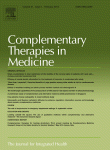
SPINE
Chinese Tuina and core stability exercises for LBP from lumbar degenerative instability
Complement Ther Med. 2016 Apr;25:45-5088 patients with low back pain (LBP) due to lumbar degenerative instability were randomized to receive either Chinese Tuina (a manipulative therapy) in combination with core stability exercises or a control group using Tuina alone. The purpose of this study was to determine whether combined treatment would yield more beneficial outcomes compared to Tuina alone. Findings indicated significantly improved Japanese Orthopaedic Association (JOA) scores and visual analogue scale (VAS) scores in the combined treatment group compared to Tuina alone after 6-weeks treatment, as well as a lower rate of recurrence after one year follow-up.
Unlock the full ACE Report
You have access to {0} free articles per month.Click below to unlock and view this {1}
Unlock NowCritical appraisals of the latest, high-impact randomized controlled trials and systematic reviews in orthopaedics
Access to OrthoEvidence podcast content, including collaborations with the Journal of Bone and Joint Surgery, interviews with internationally recognized surgeons, and roundtable discussions on orthopaedic news and topics
Subscription to The Pulse, a twice-weekly evidence-based newsletter designed to help you make better clinical decisions
Exclusive access to original content articles, including in-house systematic reviews, and articles on health research methods and hot orthopaedic topics
Or upgrade today and gain access to all OrthoEvidence content for just $1.99 per week.
Already have an account? Log in


Subscribe to "The Pulse"
Evidence-Based Orthopaedics direct to your inbox.
{0} of {1} free articles
Become an OrthoEvidence Premium Member. Expand your perspective with high-quality evidence.
Upgrade Now












































































